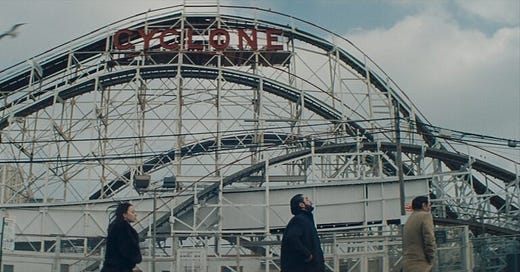By Patrick Fey
It’s not so often we come across people who serve us their breakup story with a warm, unadulterated smile. Sean Baker is one of them. Should you ever find yourself looking into his deep blue eyes and shiny white teeth while listening to his recounting of a particular date night, you might well take him for a sociopath, telling you with a mischievous grin and trembling voice about how a trip to Lars Von Trier’s Breaking The Waves (1996) ended a relationship. Looking back at his first encounter with the Danish avant-garde filmmaker, Baker remembers telling himself: “Oh, this is special. It looks beautiful, it’s speaking to me.” If Baker found himself in conversation with the Dogme 95 director that night, his then-girlfriend, unperturbed by the on-screen drama and leaving every 15 minutes for cigarette breaks, clearly felt left out. It was in this moment, Baker recounts, that he knew their relationship didn’t have a future, a memory he looks back at as fondly as other people might at their wedding night.
What’s less obvious when beholding Baker’s still boyish looks is that this little cinematic epiphany dates back nearly 30 years. Juvenile in appearance and modest in attitude, the indie filmmaker is one of these people who would cause quite an embarrassment if you ever were to age-guess them. But once you learn that his most recent picture already marks his eighth feature film, the plain math brings things into perspective. Suddenly, the grey strains in Baker’s hair fit right into the mould of someone who recently turned 54.
Opposed to some of his illustrious contemporaries such as Christopher Nolan, Sofia Coppola and Paul Thomas Anderson, it was not until the mid-2010s that Baker finally broke into the industry, when first his iPhone-shot dramedy Tangerine (2015), but more particularly his Little Rascals-inspired The Florida Project (2017), gained him, upon its world premiere in Cannes, not only critical acclaim (as Take Out [2004], Prince of Broadway [2008] and Starlet [2012] had already done) but international attention and media coverage. Reconciling stories of bleak social realism with all-the-more colourful cinematography, Baker’s recent filmmaking is, if not novel, nonetheless distinctive at a time when studios and streamers effortlessly coax talented indie filmmakers into TV projects or yet another franchise instalment concerned with the quarrels of affluent superheroes.
For many years, though, it did not look like Baker would ever complete his lifelong dream of being invited to the bright beaches of Cannes. The constant endeavours to get financing for his films, the exhausting travels to build up a name internationally and the struggle to make at least enough money to provide for his chihuahuas Boonee and Bunsen and cover rent and healthcare — it never quite seemed to pay off. Perhaps Baker is right and everything would indeed have followed a much smoother trajectory had he only taken business as a minor during his time at the prestigious Tisch School of the Arts at NYU. Making films is always an investment of time and money, and while the former rarely ever poses a snag when you are young, Baker’s career is a good reminder that, to realise a project, all the time in the world doesn’t compensate for the costs of equipment and talent in front of and behind the camera. Which is not to say that Baker didn’t try.
Read the rest over at Journey Into Cinema




